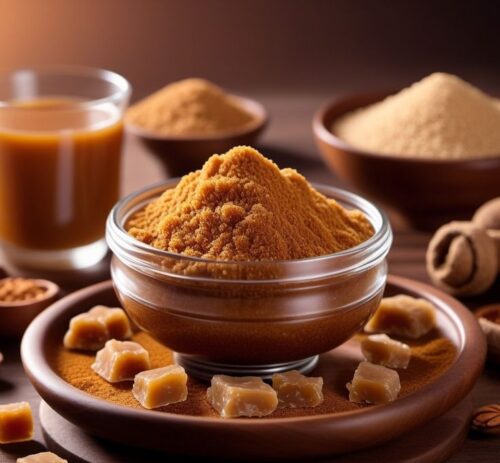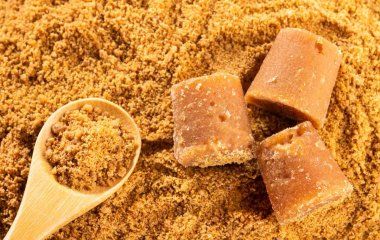In recent years, people have become more informed on the ill-health consequences associated with consumption of refined sugar. As fears of the growth of the rates of obesity, diabetes, and other ailments that result from improper diets, people are searching for healthier ways through which they can satisfy their sweet tooths. Jaggery is one such candidature as it is an unrefined sweetener which is indigenous to India and south east Asian countries and has been in use from centuries.
Compared to refined sugar which is produced through a very elaborate process and contains very minimal amount of nutritional value, jaggery is rich in nutrients and has numerous health benefits. As promised for today, in this blog, we will be discussing what makes jaggery better than refined sugar, nutritional benefits, manufacturing process, and why it should be taken daily.
What is Jaggery?
Jaggery is familiar to Indian people as “gur” which is an unrefined whole food made from the concentrated sugarcane juice or the palm sap. They call it a ‘non-centrifugal sugar’ to indicate that the molasses is not removed from the sugar during the process of its manufacture. This helps jaggery to remain golden brown in colour and stay as nutritious as possible as it is consumed.
Unlike refined sugar, which goes through a complex process of refining and adding many chemicals, jaggery is less processed and does not have any added preservatives and colors and is therefore, healthier than refined sugar for people, who want to avoid processed sugar.
 How Jaggery is made?
How Jaggery is made?
The method of making jaggery is quite non technical and the natural way of preparation and does not require chemical treatment. Here’s how it’s made:
Extraction of Juice: Sugarcane or palm tree sap is then crushed in order to extract the juice out of it.
Boiling: The juice is then heated by steaming which involves placement of the juice in large open pans for the water content to be driven off to make the juice thicker.
Skimming: When the liquid is being boiled some amount of the impurities floats on the surface and they are removed.
Cooling & Solidifying: When the juice thickens the mixture is then allowed to set in a mold which is formed by freezing the juice.
Nutritional Profile of Jaggery
Still the nutrition value of jaggery and refined sugar are greatly different due to the production process of jaggery. Although sucrose is a kind of food which is virtually devoid of nutritious value, jaggery contains vitamins and minerals that are useful for the body.
Here’s a breakdown of jaggery’s nutritional content per 100 grams: Here’s a breakdown of jaggery’s nutritional content per 100 grams:
Calories: 383 kcal
Carbohydrates: 98. 96 grams
Calcium: 80 mg
Iron: 11 mg
Potassium: 140 mg
Magnesium: 70-90 mg
Phosphorus: 20 mg
It is also rich in small traces of such minerals as Zinc, Selenium, and also has rich anti-oxidants. These micronutrients are important in carrying out several functions in the body such as, strengthening bone, fighting diseases, and providing energy among others.
Health Benefits of Jaggery
A. Rich in Antioxidants
Jaggery is rich in natural antioxidants including phenolic compounds, antioxidants that protect the body from oxidative stress and free radicals damage. Therefore, consumption of jaggery is beneficial in order to prevent aging, and decrease the risk of chronic diseases.
B. Boosts Immunity
Some of the other minor nutrients that can be obtained from jaggery include zinc and selenium which play a role in boosting immune system by acting as antioxidants that protect cells against damages due to infections. In traditional medicine, raw jaggery is known to be used to increase immune system when one is down or during winter seasons.
C. Detoxifies the Body
Jaggery has property of detoxification as well for which it is famous for. It assists in detoxification of our liver since it washes away toxins and other unwanted chemicals from the body. It also stimulates the enzymes in the digestive system and helps in the bowel movements making it to have positive effects on digestion.
D. Supports Digestive Health
On the other hand, consumption of refined sugar causes stomach upsets accompanied by bloating but jaggery stimulates enzymes required in digestion. Jaggery is sometimes ingested after eating a meal in order to improve digestion as well as reduce constipation in Indian traditional healing.
E. Provides Instant Energy
While refined sugar gives a high in energy and then a low, jaggery has a much steadier energy giving ability. This is so because a jaggery product contains complex carbohydrates which take a longer time to digest thus releasing energy gradual and at a constant rate.
F. Helps Prevent Anemia
Jaggery contains high amounts of iron, these make jaggery to be a good dietary food for people with anemia or low hemoglobin. It has been observed that taking jiggery in regular interval increases the count of red blood cells and helps in maintaining healthy hemoglobin level.
G. Relieves Respiratory Symptoms
In the Ayurvedic system of medicine, jaggery has got application in the treatment of various respiratory ailments like cold, cough and bronchitis. Because of its ability to warm Ethiopian traditional Ethiopian tea is used in the treatment of respiratory problems associated with chest congestion.
H. Regulates Blood Pressure
Potassium and sodium are, factors found in jaggery which have got an importance of an electrolyte. This may also aid in control of high blood pressure and lessening the load on the heart as well as improved circulation.
How to use Jaggery instead of Sugar?
Now that we know the benefits of jaggery, let’s look at some simple ways to incorporate it into your daily diet:Now that we know the benefits of jaggery, let’s look at some simple ways to incorporate it into your daily diet:
Sweeten Your Tea or Coffee: Refined sugar can also be replaced by jaggery while taking beverages in order to avail the benefits of the latter.
Use in Desserts: Jaggery can be substituted to sugar in most basic and complex sweet dishes including cakes, cookies, pies or Indian sweets such as kheer, laddoo’s.
Add to Smoothies or Juices: A small chunk of jaggery goes a longtime in sweetening your morning smoothies or freshly pressed juices.
In Breakfast: Add dissolved jaggery to oatmeal,porridge or yogurt to give the additional flavor and nutrients to the meal.
Snacks: Jaggery also can be eaten with the roasted peanuts or sesame seeds as snacks as well as people can prepare cookies out of it.
Conclusion : Why Jaggery is healthier Choice?
While jaggery is characterized as sugar’s healthier cousin it is indeed a nutrient dense product encompassing numerous health benefits. Loaded with nutrients for enhancing immunity and digestion along with long lasting energy and good heart health, jaggery can indeed be called the healthiest and most versatile traditional sweetener for everyday usage.
The good new is that it is possible to have your cake and eat it too when you decide to make the change from mere refined sugar to sweet jaggery which has added advantages of vitamins, minerals and antioxidants to your body. However, like all sweeteners that contain sugar molecule, jaggery should be taken in moderate portions to be healthy and live a healthy lifestyle.



